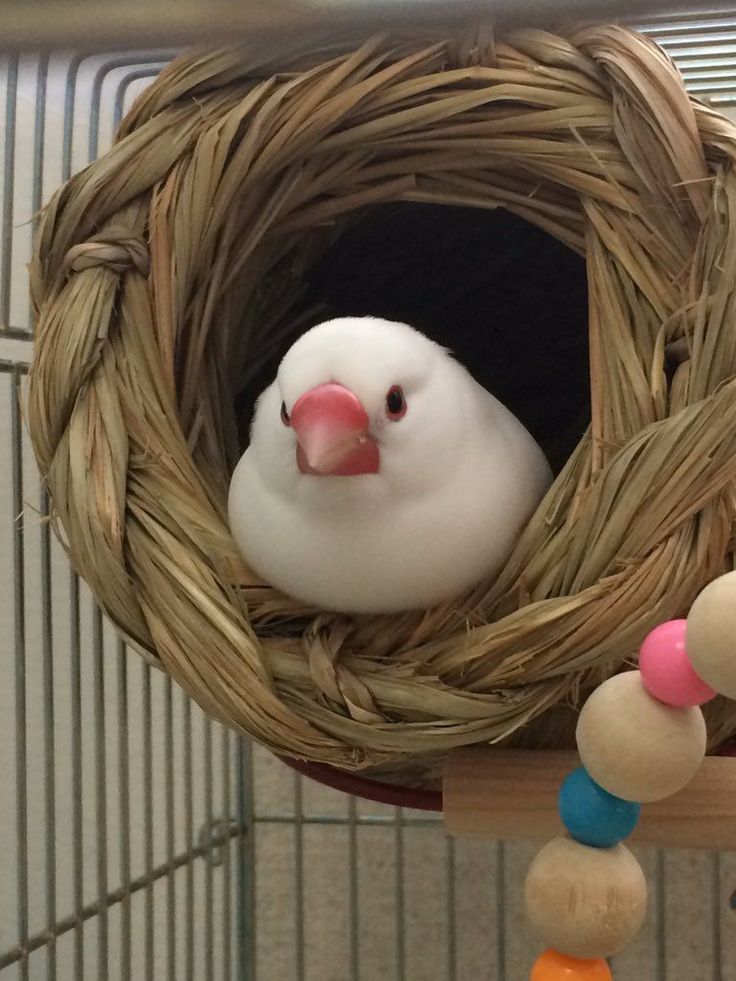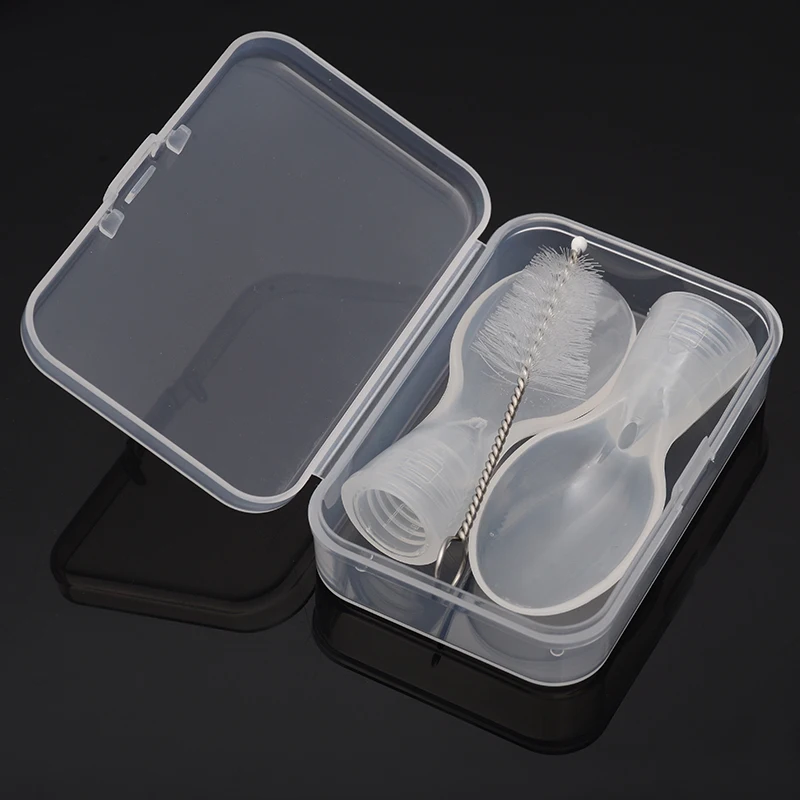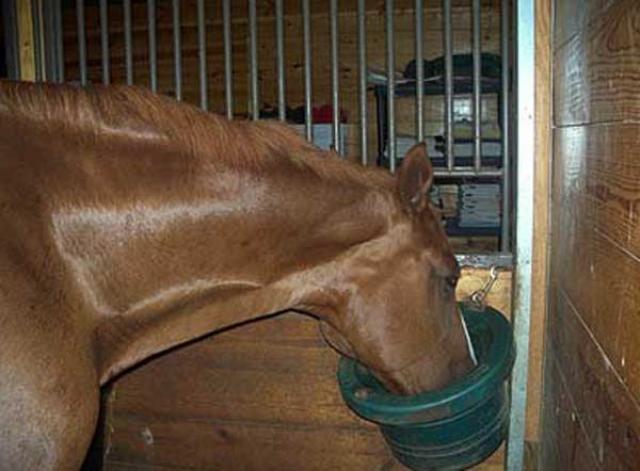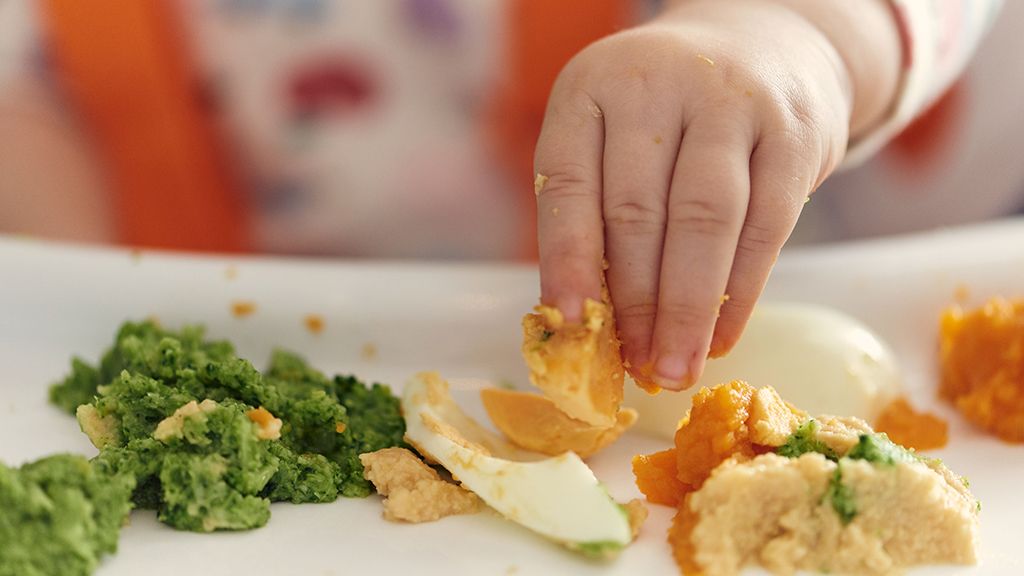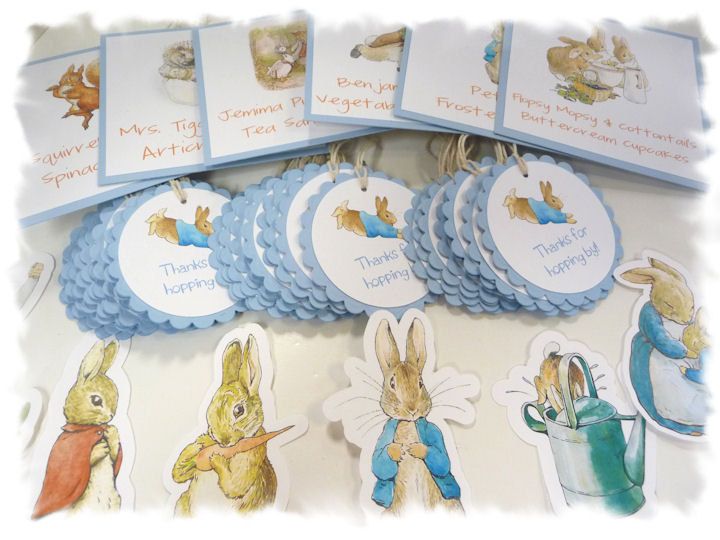Baby crying if not feeding
Crying Baby - Before 3 Months Old
Is this your child's symptom?
- A baby less than 3 months old is crying and you don't know why
- Crying is the only symptom
- The type of frequent crying called colic is included
- For crying with an illness or other symptom, go to that care guide
Causes of Unexplained Crying
- Hungry Baby. The most common reason babies cry is because they are hungry. They stop crying at the onset of feeding. By the end of the feeding, they are happy.
- Sleepy Baby. The second reason babies cry is they need sleep. They need their parent to put them in a comfortable position. It may be swaddled and on their back. Then they fuss a little and fall asleep.
- Fed Too Much. Some babies cry because of a bloated stomach from overfeeding. Unlike gas, too much milk can cause discomfort that lasts a short time.
- Caffeine. Caffeine is a stimulant that can cause increased crying and trouble falling asleep.
Breastfeeding mothers need to limit their caffeine intake.
- Clothing. Being too hot or too cold can make a baby cry. So can clothing that is too tight.
- Dirty Diaper. Stool is very irritating to the skin. If not cleaned off, it can cause pain and burning.
- Colic. Colic is the main cause of recurrent crying during the early months. All babies have some normal fussy crying every day. When this occurs over 3 hours per day, it's called colic. When they are not crying, they are happy.
- Pain (Serious). Painful causes include an earache, mouth ulcers, or a raw diaper rash. An ulcer on tip of penis may also cause pain and crying. These babies cry a lot and are not happy when they are not crying. They need to see a doctor to make a diagnosis. Fever in this age group is serious until proven otherwise. Shaken baby syndrome is a concern.
Myths About Causes of Crying
- Not Due to Gas.
 Gas passing through normal intestines does not cause pain or crying. All crying babies pass lots of gas. Their stomachs also make lots of gassy noises. The gas comes from swallowed air. The gas is normal. It does not become trapped nor cause any pains. That's why burping a baby doesn't help the crying. Blaming gas is a myth.
Gas passing through normal intestines does not cause pain or crying. All crying babies pass lots of gas. Their stomachs also make lots of gassy noises. The gas comes from swallowed air. The gas is normal. It does not become trapped nor cause any pains. That's why burping a baby doesn't help the crying. Blaming gas is a myth. - Not Due to Spitting Up. Spitting up occurs in half of babies and is normal. It does not cause crying or colic. Heartburn meds do not help crying babies. They also have side effects.
Definition of Colic
- A lot of crying once or twice per day
- Usually consolable when held and comforted
- Acts normal (happy, contented) between bouts of crying
- The baby is getting enough to eat and is not hungry
- The baby is not sick
- Onset most often before 2 weeks of age
- Usually goes away by 3 months of age (sometimes up to 4 months)
When to Call for Crying Baby - Before 3 Months Old
Call 911 Now
- Not moving or very weak
- You think your child has a life-threatening emergency
Call Doctor or Seek Care Now
- Age less than 1 month old and looks or acts abnormal in any way
- Fever in baby less than 12 weeks old.
 Caution: do NOT give your baby any fever medicine before being seen.
Caution: do NOT give your baby any fever medicine before being seen. - Bulging or swollen soft spot
- Swollen scrotum or groin
- Vomiting
- Cries when you touch, move or hold your baby
- Could be an injury
- Nonstop crying lasts more than 2 hours. Your baby can't be consoled using this Care Advice.
- Will not drink or drinks very little for more than 8 hours
- You are afraid someone might hurt or shake your baby
- High-risk child (such as with heart or brain disease)
- Your child looks or acts very sick
- You think your child needs to be seen, and the problem is urgent
Contact Doctor Within 24 Hours
- Not gaining weight or seems hungry
- New crying, but your baby can be consoled. Your baby will stop crying, but cause of crying not clear.
- You are worn out from all the crying
- You think your child needs to be seen, but the problem is not urgent
Contact Doctor During Office Hours
- Your baby has never been checked for excessive crying
- Crying started after 1 month of age
- Crying occurs 3 or more times per day
- You have other questions or concerns
Self Care at Home
- Normal crying in all babies
- Colic (Excessive crying in a well baby who can be consoled)
Seattle Children's Urgent Care Locations
If your child’s illness or injury is life-threatening, call 911.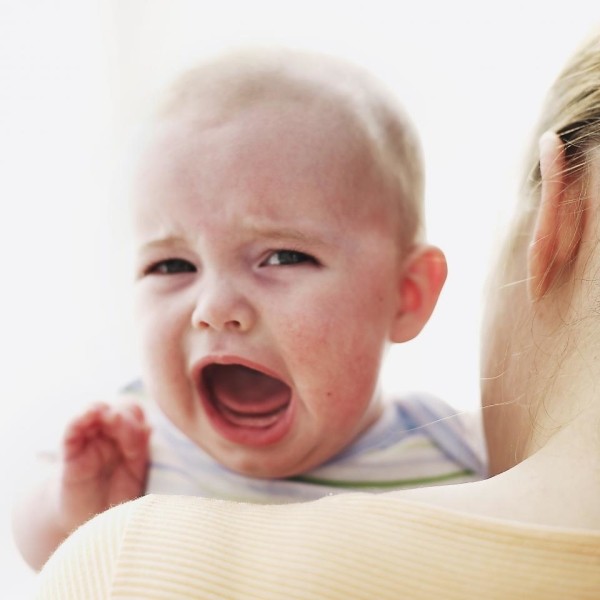
- Bellevue
- Everett
- Federal Way
- Seattle
Care Advice for Normal Crying or Colic
- What You Should Know About Crying:
- Normal Crying: all babies cry when they are hungry. Also, the normal baby has 1 to 2 hours of unexplained crying each day. It is scattered throughout the day. As long as they are happy and content when they are not crying, this is normal.
- Colic: some babies are very hard to comfort.
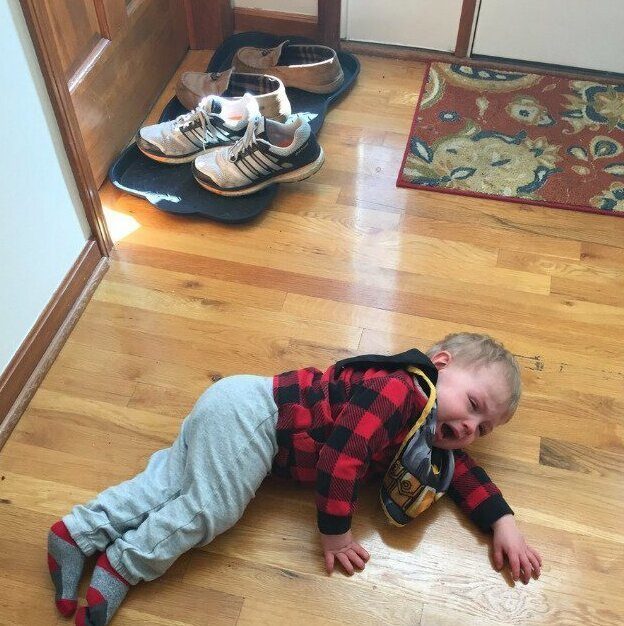 Some babies also cry a lot (over 3 hours per day). If growing normally and have a normal medical exam, the crying is called colic. Remind yourself that colic is due to your baby's temperament. It has nothing to do with your parenting or any medical disease.
Some babies also cry a lot (over 3 hours per day). If growing normally and have a normal medical exam, the crying is called colic. Remind yourself that colic is due to your baby's temperament. It has nothing to do with your parenting or any medical disease. - Here is some care advice that should help both types of crying.
- Feedings:
- For formula-fed babies, feed if more than 2 hours since the last feeding. For breast-fed babies, feed if more than 1½ hours since the last feeding.
- Be careful not to feed your baby every time she cries. Some babies cry because of a bloated stomach from overfeeding. Let your baby decide when she's had enough milk. (For example, she turns her head away.) Don't encourage your baby to finish what's in the bottle.
- Caffeine. If breastfeeding, decrease your caffeine intake. Limit your coffee, tea and energy drinks to 2 servings per day. That's 2 cups or 16 ounces (480 mL).
- Hold and Comfort for Crying:
- Hold and try to calm your baby whenever he cries without a reason.
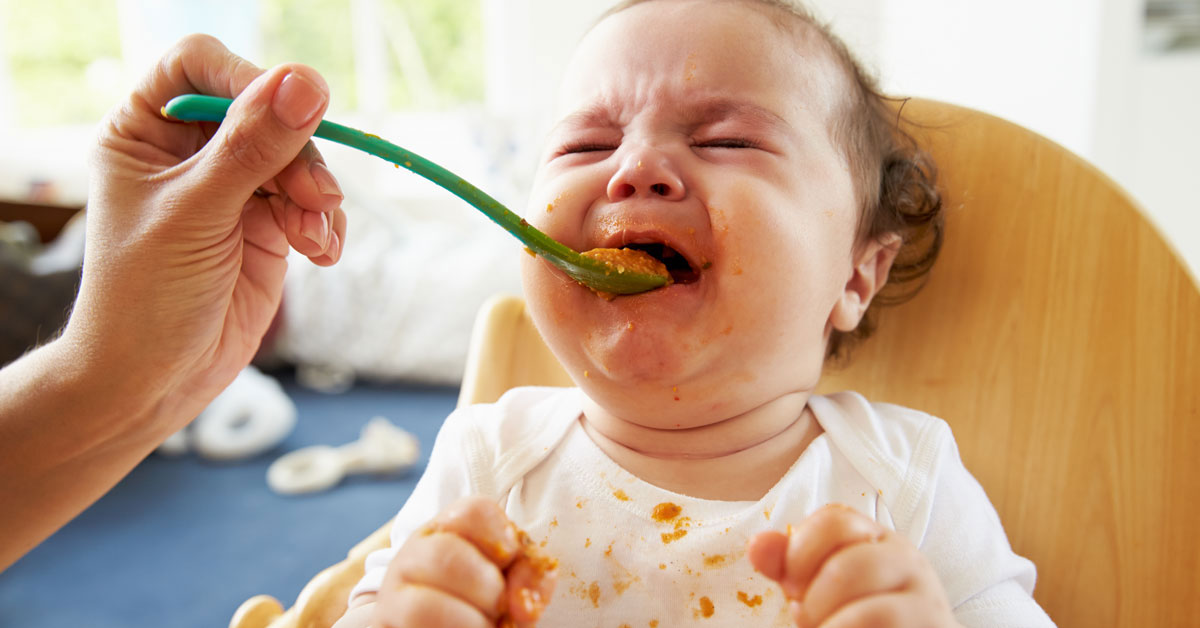 Hold your baby flat to help them relax and go to sleep.
Hold your baby flat to help them relax and go to sleep. - Rock your child in a rocking chair, in a cradle or while standing. Many babies calm best with rapid tiny movements like vibrations.
- Place in a swing or vibrating chair.
- Take for a stroller ride, outdoors or indoors.
- Do anything else you think may be comforting. Examples are using a pacifier, massage, or warm bath.
- Hold and try to calm your baby whenever he cries without a reason.
- Swaddle your Baby in a Blanket for Crying:
- Swaddling is the most helpful technique for calming crying babies. It also keeps your baby from waking up with a startle reflex.
- Use a big square blanket and the "burrito-wrap" technique:
- Step 1: have the arms inside and straight at the sides.
- Step 2: pull the left side of the blanket over the upper body and tuck.
- Step 3: fold the bottom up with the knees a little flexed. Safe swaddling keeps the legs in a straddle position.
- Step 4: pull the right side over the upper body and tuck.
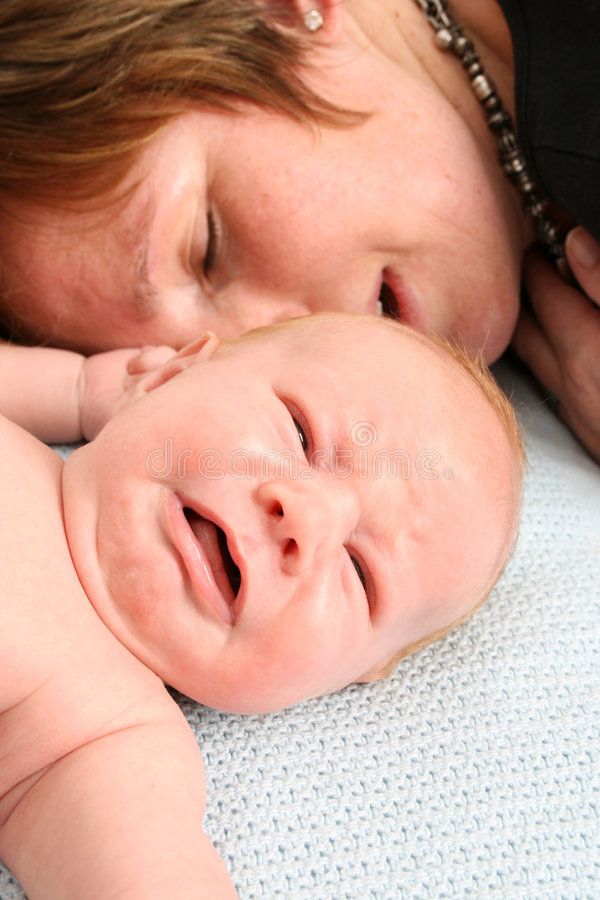
- Caution: don't cover your baby's head or overheat your baby.
- Caution: stop swaddling when your baby shows signs of rolling over. Age limit: 2 months. The startle reflex will most often be gone by this age. At 2 months, transfer to a sleep sack with the arms out.
- Read the book (or view the DVD),"The Happiest Baby on the Block". Both products are authored by Dr. Harvey Karp. It is a good resource on how to calm fussy babies.
- White Noise for Crying:
- Swaddling works even better when paired with a low-pitched white noise. Examples are a CD, vacuum cleaner, fan or other constant sound.
- Caution: avoid making white noise too loud. Reason: risk of hearing damage.
- Keep the white noise on any time your baby is crying.
- When your baby is awake and not crying, keep your baby unwrapped. Turn off the white noise. Reason: so she can get used to the normal sounds of your home. For details, view Dr. Karp's DVD.
- Falling Asleep on their Own:
- Often babies cry because they need to sleep.
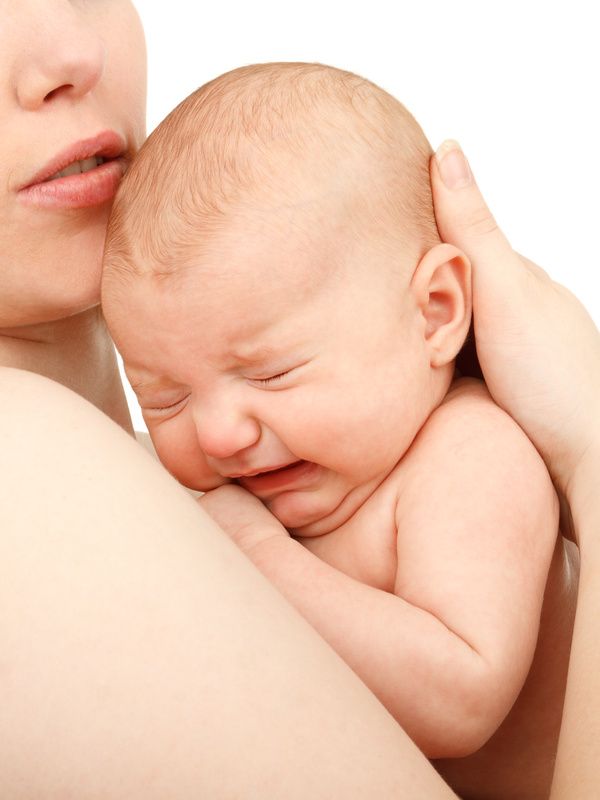 If over 2 hours have passed since the last nap, this probably is the reason.
If over 2 hours have passed since the last nap, this probably is the reason. - You have tried different ways to comfort your baby. You fed him recently. Nothing you do seems to help your baby relax. So, now, it's time to get out of the way.
- Swaddle your baby. Place him on his back in his crib. Turn on some white noise or soothing music. Then, leave the room.
- Let your baby fuss until he falls asleep.
- For some overtired babies, this is the only answer.
- Try to prevent an overtired baby. If your baby has been awake for 2 hours they often need sleep. Help them fall asleep before they become fussy.
- Often babies cry because they need to sleep.
- Encourage Nighttime Sleep (Rather Than Daytime Sleep):
- Try to keep your child from sleeping too much during the daytime.
- If your baby has napped 2 hours or longer, gently wake him up. Play with or feed your baby, depending on his needs. This will lessen the amount of time your baby is awake at night.
- Warning: Never Shake a Baby
- It can cause bleeding on the brain.
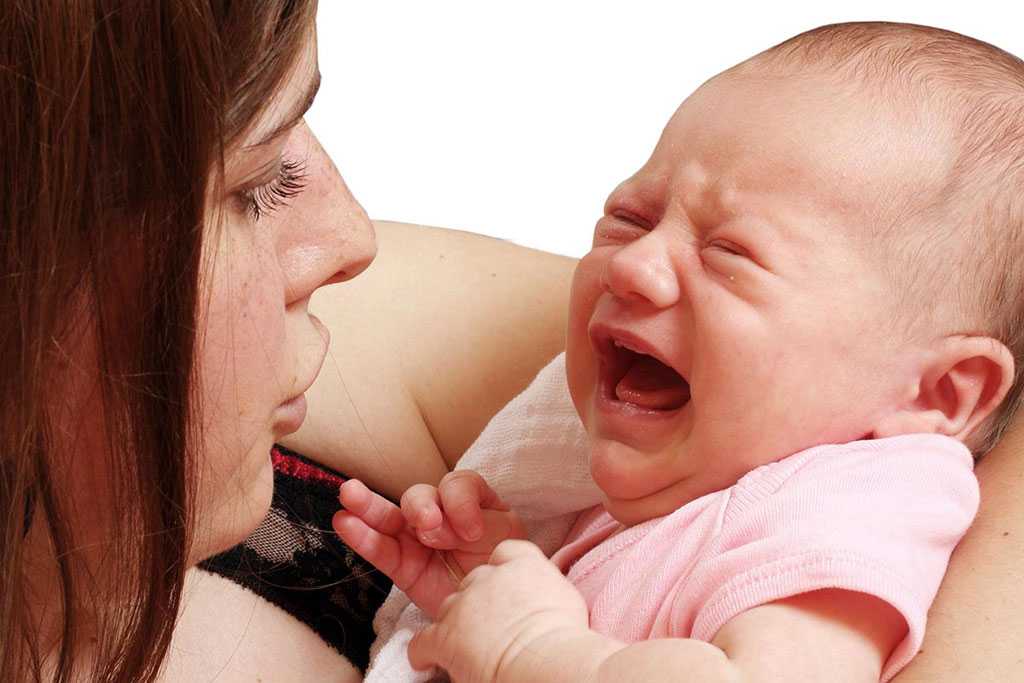 Severe brain damage can happen in a few seconds.
Severe brain damage can happen in a few seconds. - Never leave your baby with someone who is immature or has a bad temper.
- If you are frustrated, put your baby down in a safe place.
- Call or ask a friend or relative for help.
- Take a break until you calm down.
- It can cause bleeding on the brain.
- What to Expect:
- The right technique should start to reduce the crying. You may have to try several things before finding the best method.
- The crying should start to decrease to about 1 hour per day.
- Colic peaks at 4 to 6 weeks. Colic gets better after 2 months of age. Most often, it is gone by 3 months.
- Call Your Doctor If:
- Your baby starts to look or act abnormal
- Cries nonstop for more than 2 hours
- Your child can't be consoled using this advice
- You think your child needs to be seen
- Your child becomes worse
And remember, contact your doctor if your child develops any of the 'Call Your Doctor' symptoms.
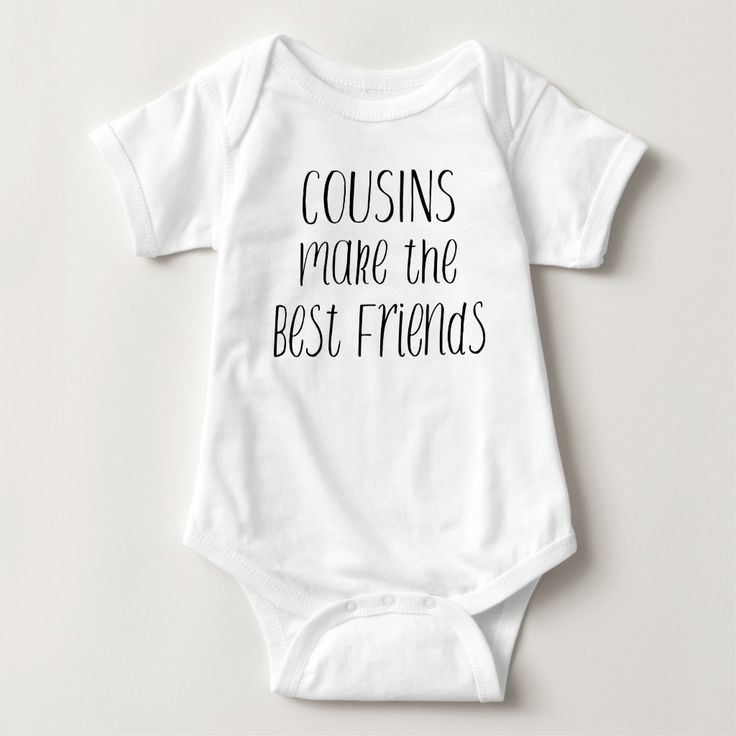
Disclaimer: this health information is for educational purposes only. You, the reader, assume full responsibility for how you choose to use it.
Last Reviewed: 10/19/2022
Last Revised: 01/13/2022
Copyright 2000-2022. Schmitt Pediatric Guidelines LLC.
Symptoms, Possible Causes, Ways to Help & When to See a Doctor
Nationwide Children’s Hospital
All babies cry, but some cry more than others. Healthy newborns start to cry more around 2 weeks of age. The crying should increase until about 6 weeks of age. After that, the crying should improve. Colic is when a healthy baby cries more than 3 hours a day for 3 or more days in a week. If this happens 3 weeks in a row, your baby may have colic. The cause of colic is unknown. Although healthy babies can have colic, crying can also be caused by physical problems. Your child should be seen by a doctor.
Symptoms
Colic usually begins by 2 to 3 weeks of age and lasts up to 3 or 4 months of age. The crying may or may not occur at the same time each day, but usually happens more often in the evening. The baby does not stop crying when usual ways of comforting, such as holding and feeding, are tried. The colicky infant usually shows these signs:
- Flailing arms and legs
- Clenched fists
- Arched back
- Legs drawn up toward abdomen
- Struggling and angry when held
Possible Causes
No one knows the real cause of colic, but some things that may be related include:
- Exposure to smoke
- Gas pain
- Immature nervous or digestive system
- Stomach spasms
Ways to Help
There is no sure treatment for colic, so it may be difficult to comfort your crying baby. The following suggestions have been tried by other parents who have had colicky infants:
- Cuddle your baby (Picture 1).
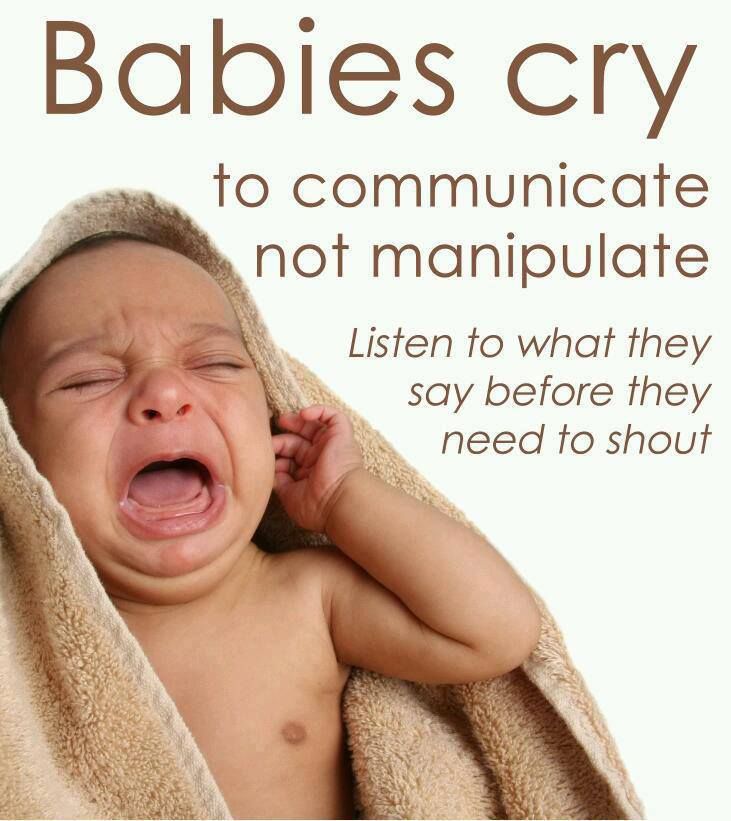
- Take your baby for a ride in a stroller or car.
- Place your baby in a wind-up swing. Prop a young infant with blankets (Picture 2).
- Rock your baby in a rocking chair.
- Give your baby a pacifier. Many infants are soothed by extra sucking.
- Burp the baby often while feeding. This removes air from the baby's stomach and reduces gas. Also try massaging the baby's stomach.
- Play soothing music or tapes of a heartbeat. This will soothe you and your baby.
- Carry your baby in a front pack. Walk while holding your baby.
- Run the vacuum cleaner or washer. The constant sound can be a comfort.
- Do not feed your baby every time he cries.
- Keep a list of the things that help your baby stop crying.
When to Call the Doctor
Call your child's doctor if your baby has any of these symptoms:
- Fever
- Diarrhea
- Hard stools
- Poor weight gain
- Excessive spitting up of formula
- Vomiting
- Blood in stools (bowel movements)
- Poor feeding
Important to Remember
Colic is a common concern.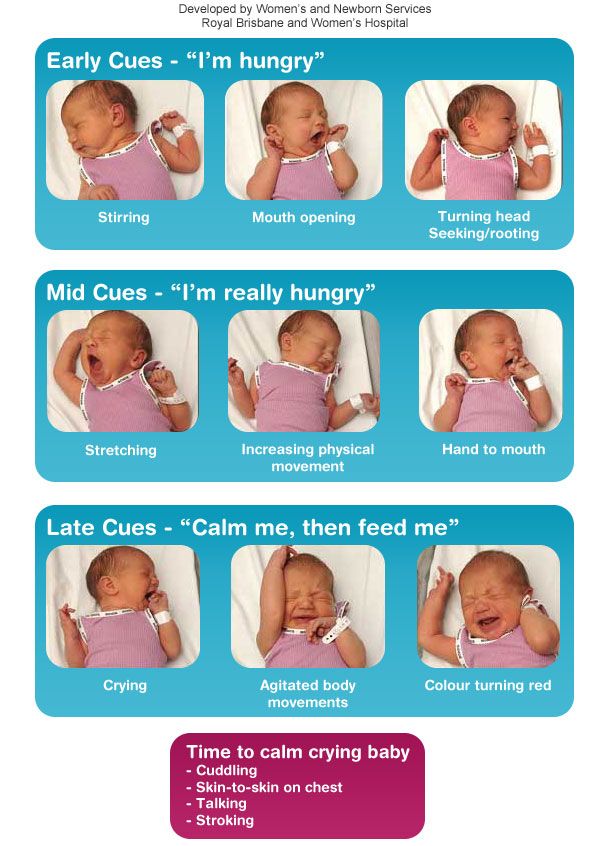 It affects 1 in 4 infants and can cause the entire family a great deal of distress. Usually colic will end between the infant's third and sixth months
It affects 1 in 4 infants and can cause the entire family a great deal of distress. Usually colic will end between the infant's third and sixth months
of life.
A baby who cries too much despite everything you do to comfort him can make the parents nervous and angry. It is important for you to remember the following things:
- Colic is not your fault.
- Your anger and frustration are normal.
- Your baby is not angry with you.
- Your baby is healthy in spite of all the crying.
Preventing Shaken Baby Syndrome
Remember, it is okay to walk away if you find yourself getting frustrated or angry with your baby or child. Your baby will not be hurt if he or she continues to cry.
Gently and safely place your baby in the crib or swing. Make sure you secure any railings or safety belts before walking away. Check on your baby every 5 to 10 minutes.
- Caution: Never shake your baby.
 Shaking will not stop the crying and could cause serious brain damage. It is important that all caregivers have this information. For more information on this, see HH-I-366, Shaken Baby Syndrome.
Shaking will not stop the crying and could cause serious brain damage. It is important that all caregivers have this information. For more information on this, see HH-I-366, Shaken Baby Syndrome. - Arrange for a relative, friend, or baby-sitter to stay with the baby while you get out of the house one evening a week. Go see a movie, shop, go out to dinner, or just take a walk.
- Try to rest when your baby naps. Getting enough rest will help relieve your tension.
If you have any questions, be sure to ask your doctor or nurse or call _____________________.
Colic (PDF)
HH-I-103, 11/82, Revised 6/14 | Copyright 1994, Nationwide Children’s Hospital
Why does the baby cry - articles from the specialists of the clinic "Mother and Child"
Bondarenko Margarita Gennadievna
Otorhinolaryngologist (ENT)
Clinic "Mother and Child" Kuntsevo,
I want to eat!
Most often the baby cries because he wants to eat. And to understand that he is hungry is the easiest way. At first, the baby shows concern, smacks his lips, turns his head to his mother's hand, stroking his cheek, tries to put his own fist in his mouth. All this means that there is very little time left before the hungry cry. Noticing such signs, you should not wait: feed the baby on demand. Otherwise, starting to cry, he will have to spend a lot of energy trying to calm down, and therefore, he will eat less and the next time he will get hungry again too soon. In general, for children who are breastfed, during the first month of life there is no clear feeding regimen. A newborn can be applied to the breast up to 10-12 times a day.
And to understand that he is hungry is the easiest way. At first, the baby shows concern, smacks his lips, turns his head to his mother's hand, stroking his cheek, tries to put his own fist in his mouth. All this means that there is very little time left before the hungry cry. Noticing such signs, you should not wait: feed the baby on demand. Otherwise, starting to cry, he will have to spend a lot of energy trying to calm down, and therefore, he will eat less and the next time he will get hungry again too soon. In general, for children who are breastfed, during the first month of life there is no clear feeding regimen. A newborn can be applied to the breast up to 10-12 times a day.
I want to sleep!
The next reason for screaming is, oddly enough, the desire to sleep. Many parents think that a baby can fall asleep anytime, anywhere, and even in almost any position. No, it's not like that - he needs help. How do you know if your baby wants to sleep? It's easy to guess.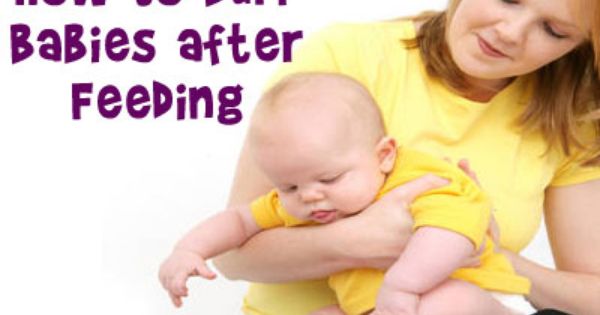 At first, he will behave restlessly, cry, push out the pacifier, rub his eyes, yawn. And then he starts crying. Here, too, it is necessary to try to calm the child as quickly as possible so that he does not disperse in crying, otherwise it will be more difficult for him to fall asleep. Rituals will help: you can shake the baby, sing a song, put it in the usual sleeping place.
At first, he will behave restlessly, cry, push out the pacifier, rub his eyes, yawn. And then he starts crying. Here, too, it is necessary to try to calm the child as quickly as possible so that he does not disperse in crying, otherwise it will be more difficult for him to fall asleep. Rituals will help: you can shake the baby, sing a song, put it in the usual sleeping place.
I'm wet!
Crying can be a signal that the baby is uncomfortable, such as a wet diaper. Cold and wet, they irritate the skin, so he screams: “Mom, dad, change me quickly!” Crying about this is whimpering, incessant, although it sounds either stronger or weaker, it may be accompanied by hiccups, as the child freezes in wet diapers. If the diaper is changed, and the baby is warmer to cover, he will calm down. If the child is not in diapers, but in reusable diapers, you should not relax either: they can leak or get wet inside. So, the baby is also wet and cold. If the child sleeps in one diaper all night, then he may be disturbed by a greatly increased diaper volume..jpg) And of course, children do not like to be in dirty diapers (diapers): feces quickly irritate delicate skin.
And of course, children do not like to be in dirty diapers (diapers): feces quickly irritate delicate skin.
I'm hot!
If the baby is hot, he will also cry about it. He will begin to whimper, scatter his arms and legs, his skin will turn red, a small red rash (prickly heat) may appear under his clothes. At the same time, the temperature of the baby sometimes even rises to 37.5 ° C. This is what saves here: the child must be undressed (and removed diapers, especially disposable ones), wiped with a towel moistened with water at room temperature, and allowed to lie in the air for several minutes. Then you need to dress the baby, but in other, clean clothes. In the fight against overheating and prickly heat, a reasonable amount of clothing and a comfortable room temperature - no higher than 24-25 ° C will help, first of all.
I'm uncomfortable!
The reason for the inconvenience can be any: the child may scream when the temperature changes, when changing clothes, changing the diaper or wiping his bottom with a damp cloth. Newborns feel more comfortable when they are dressed or wrapped in diapers, because the touch of air on the skin is not always pleasant for them. In addition, children often do not like to be changed, especially if it is winter and you have to wear a lot of clothes. There is only one way out: learn to act as quickly as possible, causing the crumbs a minimum of inconvenience.
Newborns feel more comfortable when they are dressed or wrapped in diapers, because the touch of air on the skin is not always pleasant for them. In addition, children often do not like to be changed, especially if it is winter and you have to wear a lot of clothes. There is only one way out: learn to act as quickly as possible, causing the crumbs a minimum of inconvenience.
A few words about clothes. It is better not to buy clothes with fasteners on the back and coarse seams inside - the baby may not like it. And sometimes even the slightest thread or hair caught between the clothes and the skin of the baby causes him great inconvenience.
I want attention!
Attention and tactile sensations are very important for a child. He loves to see the faces of his mom and dad, hear their voices, communicate with them. But so far, the baby cannot ask his parents to take him in his arms, read him a fairy tale, sing a song, play - but this does not mean at all that he does not need it. Therefore, crying, the baby wants to be paid attention to, requires communication. Do not worry that the baby will get used to the hands too much. While he is so small, he needs to feel a sense of security - it is this that will later help him gain confidence in his abilities. Well, different cradles, deck chairs, playpens, child seats will only help mom and dad free their hands and at the same time place their beloved child next to them.
Therefore, crying, the baby wants to be paid attention to, requires communication. Do not worry that the baby will get used to the hands too much. While he is so small, he needs to feel a sense of security - it is this that will later help him gain confidence in his abilities. Well, different cradles, deck chairs, playpens, child seats will only help mom and dad free their hands and at the same time place their beloved child next to them.
Once you learn to understand your baby's “language”, you will see that the reasons for crying vary from case to case. A little time and patience - and very soon you will understand what the child wants, already from the first seconds of his discontent.
Make an appointment
to the doctor - Bondarenko Margarita Gennadievna
Clinic "Mother and Child" Kuntsevo
Pediatric otorhinolaryngologyFor childrenDispanserizationMonitoring of children at home0003
By clicking on the send button, I consent to the processing of personal data
Attention! Prices for services in different clinics may vary. To clarify the current cost, select a clinic
To clarify the current cost, select a clinic
Clinical Hospital MD GROUPClinical Hospital Lapino-1 "Mother and Child"Children's Clinic KG "Lapino" on New Riga (branch)Clinic "Mother and Child" KuntsevoClinic "Mother and Child" SavelovskayaClinic "Mother and Child" South-WestClinic "Mother and Child" » Novogireevo
All directions
01.
Kinesiotherapy for children
02.
Specialist consultations (adults)
03.
Specialist consultations (children)
04.
Massage/manipulation for children
05.
Therapeutic research
Nothing found
The administration of the clinic takes all measures to timely update the price list posted on the website, however, in order to avoid possible misunderstandings, we advise you to clarify the cost of services and the timing of tests by calling
Tips on how to calm a crying child
Crying is a way for a child to communicate, but despite its naturalness, it is useful to try to calm a crying child. It is logical that parents will have a question: “How to calm the child?” This may seem like a daunting task at times, but understanding the reasons will help you learn how to soothe a crying baby. Remember: you are doing great. We just want to give you some useful tips to help ease your worries.
It is logical that parents will have a question: “How to calm the child?” This may seem like a daunting task at times, but understanding the reasons will help you learn how to soothe a crying baby. Remember: you are doing great. We just want to give you some useful tips to help ease your worries.
If you have any questions or concerns about your baby's crying, seek medical advice. Sometimes crying can be a sign of an existing medical condition, so it's best to pay attention to any additional symptoms right away.
Why your baby is crying
Baby crying is not only natural but also expected, especially during the first three months of life. Babies usually cry for an hour every day for the first few weeks. At about six weeks old, your baby may cry for up to two hours a day, and from eight weeks on, again for about one hour a day. However, remember that all babies are different and cry differently! 1
Crying is a way of saying something is wrong. When it comes to learning how to soothe a crying baby, it's important to understand what exactly is causing her anxiety. Your baby may cry if: 1
When it comes to learning how to soothe a crying baby, it's important to understand what exactly is causing her anxiety. Your baby may cry if: 1
- he is hungry;
- baby has belching or bloating;
- need a diaper change;
- he wants to sleep;
- wants to be picked up or rocked;
- the baby is hot or cold;
- baby has colic;
- feels uncomfortable: wants to roll over, presses on diaper or clothes, or tight swaddling interferes with baby;
- the baby is teething.
If your baby cries for more than three hours a day and more than three days a week, he may be suffering from colic. However, this is not a reason to panic, and there are several ways to soothe a child with colic. Find out here about colic, its symptoms, and how to soothe a baby with colic.
If you think reflux (regurgitation) may be the cause of your crying, you can learn more about the different types of reflux and how to manage it here.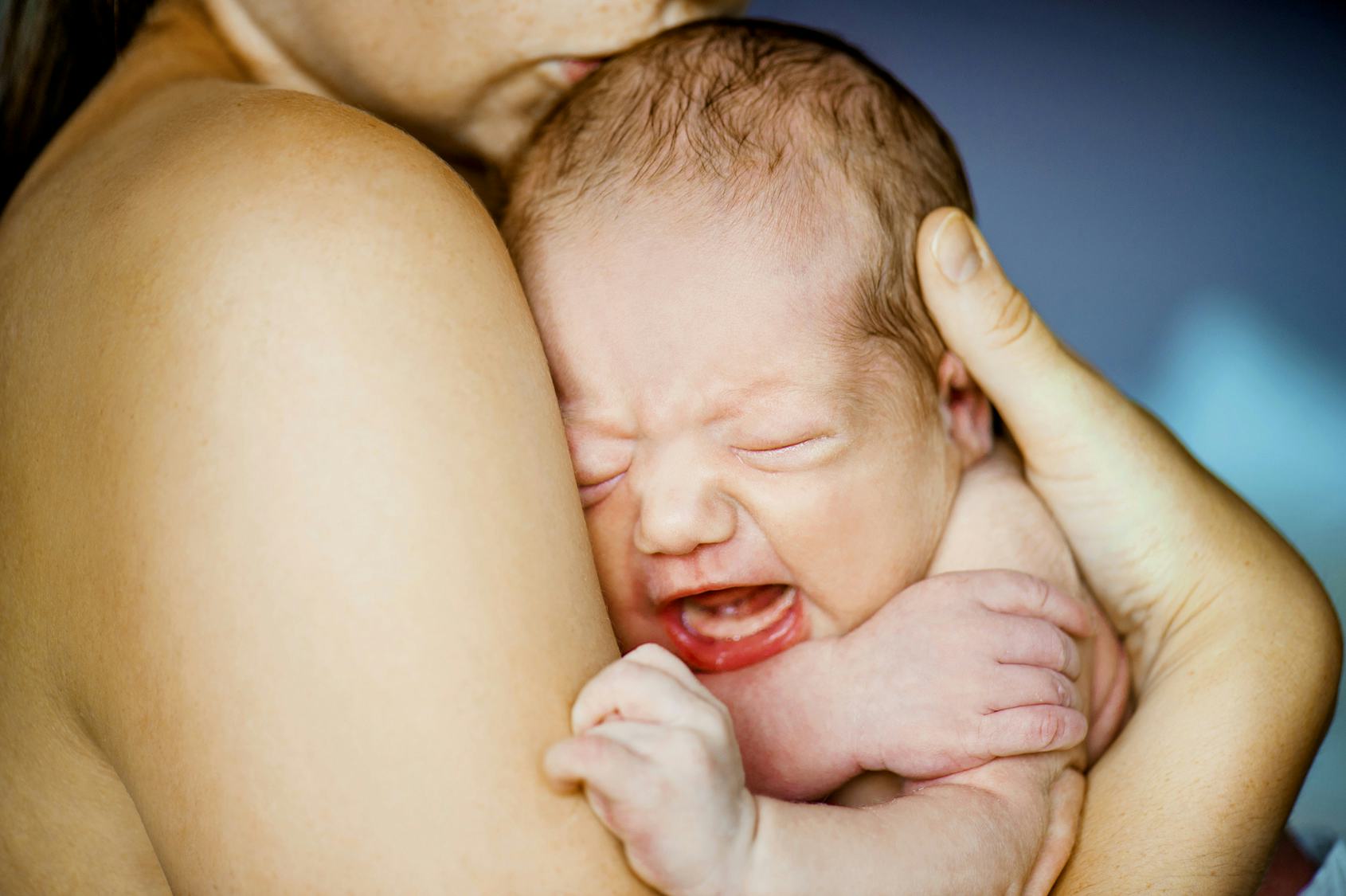
Be sure to call your baby's doctor if your baby seems ill or has the following symptoms in addition to excessive crying: 1
- fever;
- shortness of breath or cough;
- vomiting;
- diarrhea;
- rash;
- crying worse when the child is picked up or moved;
- increased irritability or lethargy.
How to soothe a crying baby
Once you have ruled out some potential causes of crying, you will have a better idea of how to soothe your baby. The most important thing to remember is not to get upset and stay as calm as possible.
Here are some tips and tricks on how to calm your baby: 2
1. Swaddle your baby.
One of the most useful techniques to soothe a crying baby is swaddling. When doing this, make sure that you do not cover the child's head and do not overheat him.

